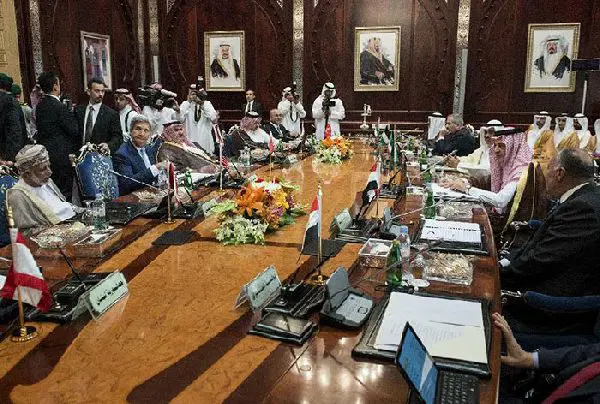
RIYADH — The United States signed up Arab allies on Thursday to a “coordinated military campaign” against “Islamic State” fighters, a major step in building regional support for President Obama’s plan to strike both sides of the Syrian-Iraqi frontier.
After talks in Saudi Arabia’s summer capital Jeddah, Secretary of State John Kerry won backing from 10 Arab countries – Egypt, Iraq, Jordan, Lebanon and six Gulf states including rich rivals Saudi Arabia and Qatar – for a coalition to fight the extremist militants who have seized swathes of Iraq and Syria.
“Arab nations play a critical role in that coalition, the leading role really across all lines of effort: military support, humanitarian aid, our work to stop the flow of illegal funds,” Kerry told a news conference.
Non-Arab Sunni power Turkey also attended the Jeddah talks, but two other major regional players – Iran and Syria itself – were excluded, a sign of the difficulty of building a coalition across the Middle East’s sectarian battle lines.
The Arab states agreed in a communique to do more to stop the flow of funds and fighters to “Islamic State” and help rebuild communities “brutalized” by the group.
“The participating states agreed to do their share in the comprehensive fight against ISIL, including … as appropriate, joining in the many aspects of a coordinated military campaign against ISIL,” they said, using the acronym for Islamic State in Iraq and the Levant, a former name for the group.
Kerry met the Arab leaders to drum up support a day after Obama announced his plans to strike fighters in Iraq and Syria.
U.S. officials said Kerry also sought permission to make more use of bases in the region and fly more warplanes overhead, issues that were not mentioned in the communique. Kerry said none of the countries in the coalition would send ground troops.
In a hopeful sign of outreach across the sectarian divide that has spread war across the Middle East and fed “Islamic State’s” militancy, Sunni Saudi Arabia said it might open an embassy in Shi’ite-ruled Iraq after decades of suspicion.
The Saudis, who support other Sunni armed movements in Syria but consider “Islamic State” a terrorist group, have also promised to help Obama’s campaign by providing training camps for moderate Syrian Sunni fighters.
But Iran, a supporter of Syria’s President Bashar al-Assad, said it had severe reservations over the new U.S.-led coalition, and doubted it would fight “the root causes of terrorism”, which it blames squarely on states like Saudi Arabia.
An alliance against “Islamic State” is bound to require cooperation from countries that consider each other enemies. Washington itself supports the government in Iraq, but opposes Assad in Syria; it is allied to most Arab states, while hostile to Iran.
A State Department official traveling with Kerry said the top U.S. diplomat would the ask allies to make room for U.S. military activity: “We may need enhanced basing and overflights … there’s going to be a meeting soon of defense ministers to work on these details.”
Kerry would also urge regional television news outlets, particularly Qatari-owned Al Jazeera and Saudi-owned Al Arabiya, to air anti-extremist messages. Governments in the region would be urged to press mosques to preach against “Islamic State.”
“They need to get at the clerics because the clerics can get at the mosques in the neighborhood and they have to expose ISIL for what it is,” the official told reporters.
Washington also wants more efforts to stop the flow of money to the group by tackling oil smuggling and cracking down on contributions from private donors, the official said.
Lebanese Foreign Minister Gebran Bassil said there was extensive discussion in Jeddah about whether the campaign should be broadened to include other Islamist groups, not just “Islamic State.”
Bassil urged the international community to present a “common front” against Islamic State in what he called a battle between “humanity” and “monsters.”
This is something that strongly anti-Islamist Gulf Arab states such as the United Arab Emirates had sought. Despite attending the talks, Turkey was not mentioned in the communique, an omission attributed by a senior Turkish official to sensitivities about 46 Turkish hostages held by the fighters. Turkey will discuss the needs of the alliance with Kerry on a visit to Ankara he starts on Friday, the official said.
Iranian foreign ministry spokeswoman Marzieh Afkham, said on state television of the U.S.-led alliance that there were “severe misgivings about its determination to sincerely fight the root causes of terrorism.”






Leave a Reply